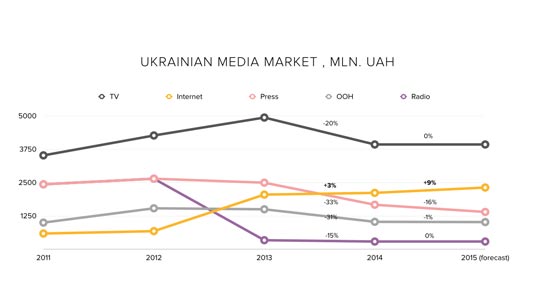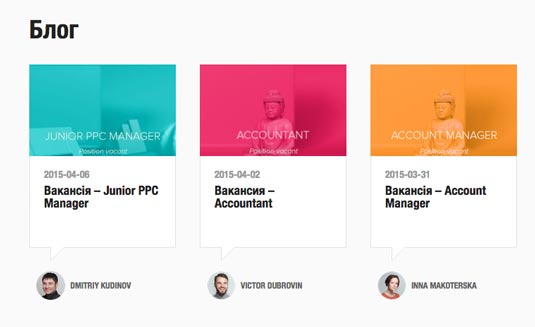How agencies can survive a national crisis
With the right approach you can thrive even in the midst of crisis, says Roman Havrysh of Ukranian agency Aimbulance.
Sign up to Creative Bloq's daily newsletter, which brings you the latest news and inspiration from the worlds of art, design and technology.
You are now subscribed
Your newsletter sign-up was successful
Want to add more newsletters?

Five times a week
CreativeBloq
Sign up to Creative Bloq's daily newsletter, which brings you the latest news and inspiration from the worlds of art, design and technology.

Once a week
By Design
Sign up to Creative Bloq's daily newsletter, which brings you the latest news and inspiration from the worlds of art, design and technology.

Once a week
State of the Art
Sign up to Creative Bloq's daily newsletter, which brings you the latest news and inspiration from the worlds of art, design and technology.

Seasonal (around events)
Brand Impact Awards
Sign up to Creative Bloq's daily newsletter, which brings you the latest news and inspiration from the worlds of art, design and technology.

Running an agency in Ukraine in the last couple of years has not been easy.
According to the All-Ukrainian Advertising Coalition, the media market has lost 20 per cent of its income in the last year. This market directly depends on clients' budgets, and these are continually falling because of disappearing markets in Eastern Ukraine and Crimea, fluctuating exchange rates, and a fall in people's purchasing power.
As a result, some creative and media agencies have disappeared altogether, while even the largest ones have had to reduce staff.
Export option
Under such difficult circumstances, some businesses might react by expanding into new markets. But creative and media products are not always so easy to export abroad, due to the specific nature of the market, the highly competitive climate, a lack of local qualifications and often the necessity of a physical presence.
In digital agencies, one product that can be exported globally is websites, especially design, programming and UX. For this, the understanding of market specificity isn't required as it is with creative, strategy or media services. So bright opportunities for expansion to new markets are open to Ukranian digital agencies in Kazakhstan, Russia, USA and Poland.

Kazakhstan looks now especially attractive. In general, Kazakhs don't possess the necessary qualifications and experience that Ukraine's professionals can deliver. They also offer better financial conditions in terms of foreign currency.
Client issues
And what about clients? Many clients' businesses basically run on importing goods, so they have been forced to increase prices. That, plus the lower purchasing power of the population, has led to falling profits. The very first reaction to this is usually to minimize advertising and marketing budgets.
Sign up to Creative Bloq's daily newsletter, which brings you the latest news and inspiration from the worlds of art, design and technology.
But clients also know that cutting back on advertising and marketing will make it more difficult to maintain their leading position. So this is driving them to seek greater returns on the money they do spend.
This is accelerating the trend away from traditional media to the internet, where rewards are easier to calculate and market entry threshold is lower. Before the crisis, the main priority was to produce a 'wow-effect' in the relevant manager. But now, more attention is being paid to sequential logic, final output and measurable return on marketing investment.
Coping strategies

By capitalising on this trend at Aimbulance Agency, our positions during last year remained stable. This stability stemmed from our strategy to prioritise efficiency of communication.
Aiming to find the way out of a complicated economical situation, we took the decision to export our product (websites: programming and design) to markets abroad.
And although our work is of international standard – just check out out Cannes Lions, Golden Drum and EFFIE Awards if you don't believe us – we offer reasonable prices (cost of service per hour was $50; it's now $25).
Growth prospects

The quality of advertising work for the Ukrainian market is going to get worse. That's made clear already by observing local advertising festivals: they're getting fewer project applications, and those they receive increasingly don't match up to expected standards.
That's because some agencies have reoriented and left the local market altogether, resulting in a talent drain that's bad for the national industry as a whole
Exporting work to foreign markets but at the same time staying in touch with local markets is needed to help stabilizise the Ukrainian sector. By combining both markets, the agency will get income in a variety of currencies, stabilising income.
If other agencies can follow our example and supply services to local and overseas clients, business in our country will continue to grow. This will create a virtuous circle, as new job positions are created locally, and agencies with international experience will also seek to work in Ukraine.
Words: Roman Havrysh
Roman Havrysh is strategic director at Aimbulance.
Liked this? Read these!

The Creative Bloq team is made up of a group of art and design enthusiasts, and has changed and evolved since Creative Bloq began back in 2012. The current website team consists of eight full-time members of staff: Editor Georgia Coggan, Deputy Editor Rosie Hilder, Ecommerce Editor Beren Neale, Senior News Editor Daniel Piper, Editor, Digital Art and 3D Ian Dean, Tech Reviews Editor Erlingur Einarsson, Ecommerce Writer Beth Nicholls and Staff Writer Natalie Fear, as well as a roster of freelancers from around the world. The ImagineFX magazine team also pitch in, ensuring that content from leading digital art publication ImagineFX is represented on Creative Bloq.
